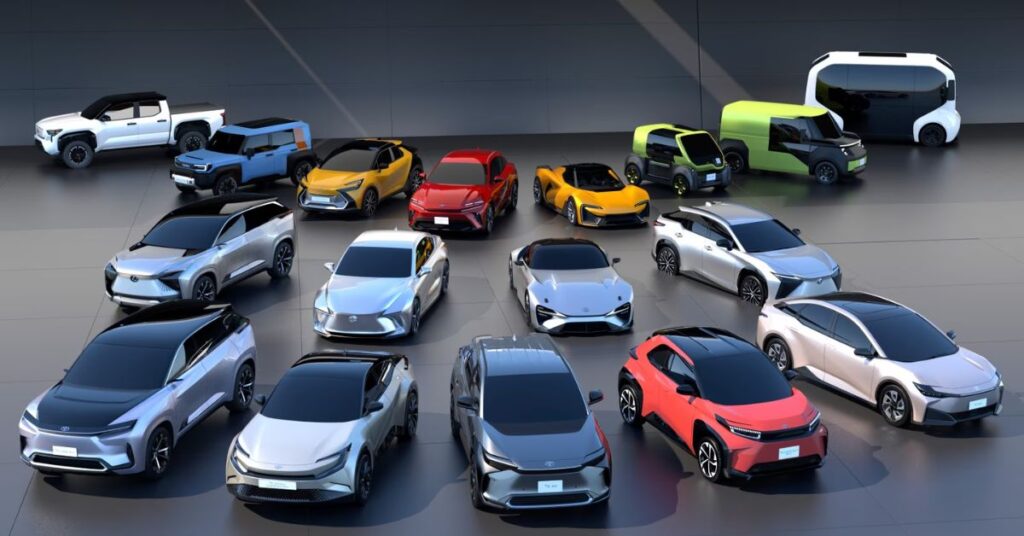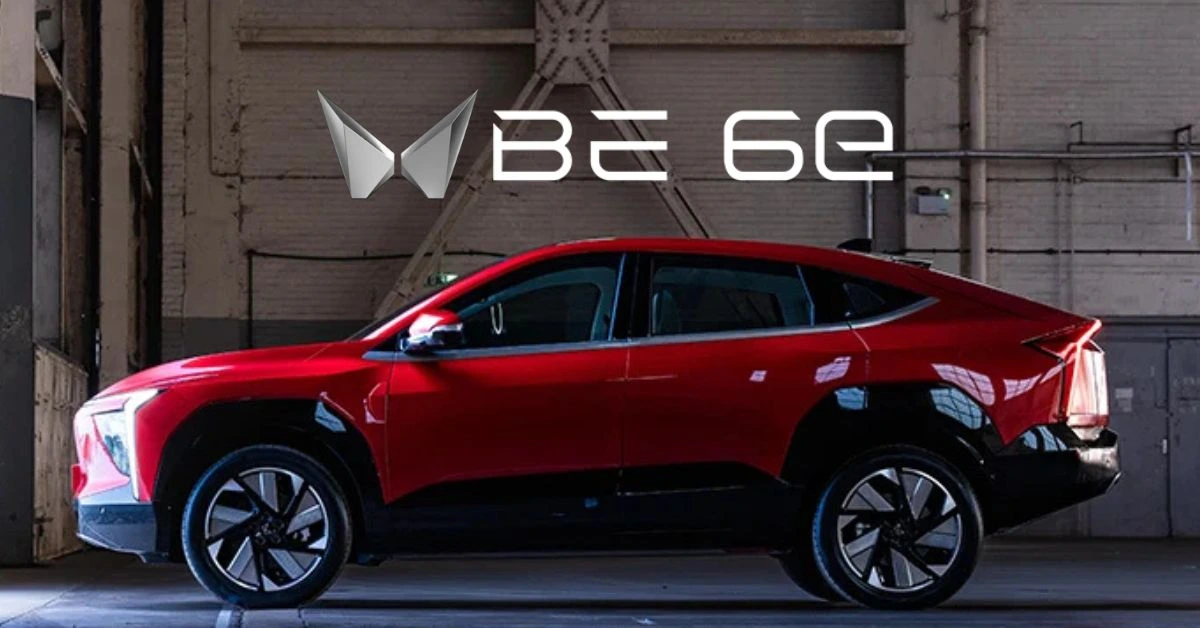Toyota Opens EV Plant in China: 1st Lexus Electric Vehicle Factory in Shanghai
The Japanese automotive giant, Toyota, has confirmed plans to open its first-ever electric vehicle (EV) manufacturing plant in Shanghai, China. This groundbreaking move will see Toyota ramp up its efforts to produce luxury electric vehicles, including its well-known Lexus brand, with production slated to begin around 2027. The new plant aims to strengthen Toyota’s competitive position in the rapidly expanding EV market and help it counter the growing dominance of local Chinese EV manufacturers, such as BYD.
In this blog, we will explore the details surrounding Toyota’s plans for its new Shanghai-based EV plant, the strategic importance of this move, and what it means for the future of electric mobility both in China and globally.
Table of Contents
Why Toyota Opens EV Plant in China?

China has long been the world’s largest market for electric vehicles, and the country’s role in shaping the future of EV technology cannot be overstated. By opening an independent EV manufacturing facility in Shanghai, Toyota is positioning itself to take full advantage of China’s booming EV sector.
This shift marks a departure from Toyota’s previous approach in the country, which involved joint ventures with local manufacturers such as GAC Group and FAW Group. With the opening of this new plant, Toyota plans to take full control of its operations, giving it more flexibility to respond to the demands of the Chinese market.
Key Details About Toyota’s New EV Factory in Shanghai:
| Feature | Details |
| Location | Shanghai, China |
| Product Focus | Lexus Electric Vehicles (EVs) |
| Start of Operations | 2027 |
| Operating Model | Independent (no joint venture) |
| Expected Production Capacity | Estimated to be several thousand units annually |
| Strategic Goal | Boost Toyota’s presence in China’s EV market |
Why Shanghai?
The main goal of this new plant is to manufacture Lexus EV models to cater to the growing demand for premium electric vehicles in China. Lexus, Toyota’s luxury brand, is well-positioned to capitalize on the rise in consumer interest in high-end electric cars, making this a strategic move to expand Toyota’s footprint in China’s luxury car segment.
According to reports, Toyota hopes to start production by 2027. This timeline is crucial for Toyota, as it is working to increase its presence in the EV sector in response to increasing competition from domestic Chinese EV makers and international giants like Tesla.
Key Benefits of Shanghai for Toyota:
- Strategic Location: Close to key EV technology developers and component suppliers.
- Government Incentives: The city offers tax breaks, land grants, and policy support, making it an attractive destination for automakers.
- Market Demand: Shanghai is one of the largest markets for premium vehicles in China, making it a natural choice for Lexus EV production.
- Increased control over manufacturing and sales, without the need for joint venture partners.
- Enhanced competitiveness in China’s growing EV market.
- Increased production of Lexus EVs, a luxury brand that Toyota hopes will appeal to Chinese consumers.
- Job creation and potential for future expansion in the region.
What Makes the New Plant Significant?
Toyota’s new plant in Shanghai will primarily focus on producing Lexus EVs, the automaker’s luxury arm. The facility will allow Toyota to cater to the growing demand for high-end electric vehicles in China, which has seen increasing interest in premium EVs.
Toyota’s decision to operate the factory independently without a joint venture partner is a notable shift. This move reflects the company’s desire to have more control over production and sales in the Chinese market, where it faces intense competition from both local and international companies.
This factory represents a significant step for Toyota in several ways:

- First Independent Factory in China:
Toyota has primarily worked in China through joint ventures. The Shanghai facility will be the first factory in the country operated independently by Toyota, which marks a major strategic shift. - Focus on Lexus EV Models:
The plant will primarily produce Lexus electric vehicles, a move aimed at competing directly with other high-end electric car brands like Tesla, which has already established a strong presence in China. Lexus has traditionally been a well-regarded brand in the luxury car market, and producing EVs will help Toyota tap into the growing demand for environmentally friendly yet premium vehicles. - Independence from Local Partners:
Unlike Toyota’s previous partnerships in China, the new plant will be operated independently, which means Toyota will have full control over production, sales, and pricing strategies in China.
Toyota’s decision to build the EV plant in Shanghai reflects the company’s ambition to stay ahead in the competitive global automotive market. Here’s a statement from the Toyota CEO:
“Our goal with the new plant in Shanghai is to strengthen our global position in the electric vehicle market, particularly with our Lexus brand, and address the growing consumer demand for high-quality, luxury EVs,” said Akio Toyoda, CEO of Toyota Motor Corporation.
How This Move Fits into Toyota’s Global EV Strategy
The opening of the new EV plant in China aligns with Toyota’s broader global strategy to increase its production and sales of electric vehicles (EVs). Despite the global shift toward EVs, Toyota has faced criticism for being slow to fully embrace all-electric models, with much of its focus on hybrid technology.
However, with global demand for electric vehicles soaring, particularly in markets like Europe and China, Toyota is now looking to ramp up its efforts. The company has already announced plans to produce around 1 million EVs annually by 2026, including the production from this new Shanghai plant.
The Plant’s Location in Shanghai
Shanghai was chosen for several key reasons:
- Proximity to Key Markets: Shanghai is a major automotive hub in China, giving Toyota easy access to both manufacturing and consumer markets.
- Government Incentives: Toyota is reportedly negotiating with the Chinese government for tax breaks and land grants, similar to the incentives enjoyed by companies like Tesla. These incentives are likely to help Toyota reduce costs and compete more effectively against local Chinese automakers.
- Strategic Location for Exporting: With Shanghai being one of China’s most prominent export cities, Toyota will have easy access to shipping its EV models to other parts of the world, strengthening its global supply chain.
Challenges and Competition in the Chinese EV Market
Toyota’s sales in China have recently faced pressure, with Toyota’s sales in the first half of the year dropping by 11%. This decline is attributed to strong competition from local EV manufacturers like BYD and NIO, which have been more aggressive in developing and marketing electric vehicles. By investing in this new EV plant, Toyota hopes to regain ground in one of the largest EV markets in the world.
Key Market Challenges:
- Local Competition: Brands like BYD and NIO are gaining market share.
- Changing Consumer Preferences: Increasing demand for electric vehicles over hybrids.
- Regulatory Environment: Navigating the local regulatory landscape can be complex.
To overcome this competition, Toyota will need to offer more competitive pricing, advanced features, and a strong brand identity in the electric vehicle sector.
Conclusion: Toyota’s Strategic Shift Toward EVs
Toyota’s decision to open its first-ever independent EV plant in China is a clear signal of the company’s commitment to the electric vehicle market. By focusing on its luxury Lexus brand and ramping up production in a key growth market like Shanghai, Toyota is positioning itself to better compete with local giants and global rivals.
With a targeted 2027 launch for the new facility, Toyota is set to enter a new chapter of EV production, potentially altering the competitive dynamics in the Chinese automotive market for years to come.
Read more: BYD Seal Wins Japan Car of the Year Award 2024 – First Chinese Car to Achieve This!
FAQs
Why is Toyota opening an EV plant in China?
Toyota is opening its first EV plant in China to boost its presence in the world’s largest car market, which is seeing rapid growth in the electric vehicle sector.
When will the new Lexus EV plant start operations?
The plant is expected to start operations in 2027, focusing on producing electric vehicles for Toyota’s luxury brand, Lexus.
What models will Toyota produce in its new Shanghai factory?
The factory will primarily produce Lexus electric vehicles (EVs), expanding Toyota’s luxury EV offerings in China.
Is Toyota working with local partners for this new plant?
No, unlike its previous ventures, Toyota is building and operating this factory independently in China without a local partner.
How does Toyota plan to compete with local Chinese EV manufacturers like BYD?
By opening the EV plant in China, Toyota hopes to reclaim market share from local competitors like BYD and increase the production of luxury EV models for Chinese consumers.
What benefits will Toyota gain from the new factory in Shanghai?
The factory will provide greater control over production, access to policy support, and the ability to produce more Lexus EVs, helping Toyota strengthen its position in the Chinese market.



